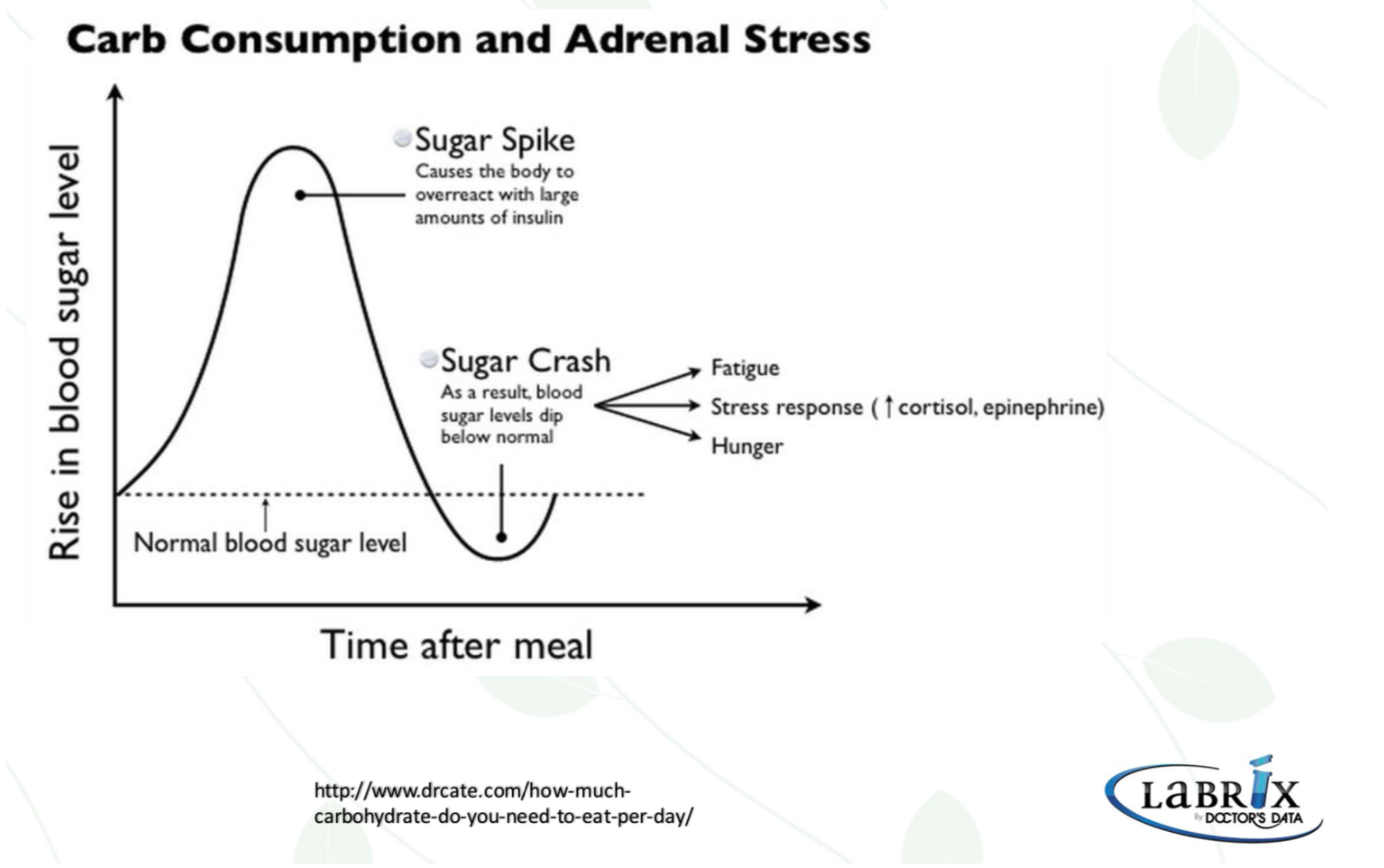The Adrenal/Blood Sugar Connection and How to Eat to Heal
Information on Hypoglycemia
Heather Hunt DC
Also there is a shortened version of this on my You Tube Channel https://www.youtube.com/watch?v=BWnexiQ1JC0
Hypoglycemia (low blood sugar) occurs when our bodies cannot hold blood sugar stable and the blood sugar level dips too low resulting in undesirable symptoms like:
Feel shaky
Irritable
Cranky/“hangry”
Inability to think
Lack of concentration
Craving sweets/sugar
Dislike eating breakfast
Feel better after meals
Waking in the night
Crave caffeine
Wake too early in AM
Afternoon fatigue
Headache
Strenuous exercise difficult to do
Hard to stay balanced
Mood swings
Nausea
Many Causes of Hypoglycemia. It seems to run in families, be more common in women, and go with adrenal dysregulation issues. The understanding of the adrenal connection often goes missed, and I consider it to be essential to understanding and treating blood sugar issues. The adrenal glands are part of the endocrine (hormonal) system and are little glands that sit on the kidneys. Among other jobs, they secrete the hormones adrenaline and cortisol to respond to stress and can be considered the first responders. These glands are responsible for monitoring the environment (both internal in the body and external) to see if we are safe and balanced. They respond if there is any threatening or stressful situation and put the gears in motion for what we call “fight, flight or freeze” (aka survival mode). What has gotten aberrated in modern times is that stress can come in many forms. In most situations the response needed is not triggered by being attacked by a tiger, an encroaching famine, and other true survival needs. Now our main stress comes through blood sugar swings, alarming news headlines, relationship tension, the demands of work, the go go go nature of our world. Likewise, the more empathic and sensitive we are we can have stress from (an empathic response) seeing someone suffering, throwing plastic in the “recycling,” illness in others, animal suffering, trees being cut down, climate change, etc). And interestingly, the adrenals activate even to good stress like having a baby, getting married, going on vacation. It is all stress and triggers a survival mode of thinking and doing and a slip into the fight, flight or freeze response.
Adrenal Dysregulation. As you can imagine, in our times the adrenals get overtaxed from very young ages. Even with a perfect upbringing and family, if one is sensitive, there is still stress (nightmares, scary movies, the demands of school, perfectionism). If there is overt trauma well then game over, just know you will likely have an adrenal issue. There are many types of adrenal problems. Overly excited adrenals secrete too much cortisol and adrenaline and will result in feeling wired and also feelings of anxiety, panic, worry and dread. Exhausted adrenals will let you not get off the couch, no sex drive, just being really tired and not even being able to push yourself through exercise, etc without sugar and/or caffeine. What I think most common is what I call dysregulated adrenals. In this situation they are neither hyper or fatigued, but they are dysregulated (out of balance) and will secrete too much adrenaline/cortisol inappropriately giving you an anxious/wired/mind racing/feeling unsettled experience with an underlying deep fatigue.
NOTE: People who do not have robust adrenal health and/or have this tendency towards hypoglycemia will likely NOT DO WELL with Ketogenic Diets and Intermittent Fasting. Stabilize the adrenals first.
Adrenals and Blood Sugar. Adrenals monitor internal stress and what is out of balance in our bodies. We are focused here on blood sugar, and sure enough the adrenals monitor blood sugar levels to make sure we are well fed and safe. When the blood sugar dips low between eating, the adrenals signal the liver to secrete stored blood sugar (glycogen) to keep endogenous/internal blood sugar levels stable. But what if the adrenals are exhausted themselves? Then they do not respond well and the person stays hypoglycemic and needs to eat their way to more energy and grabs a carbohydrate (sugar, starch, grain, fruit) or caffeine. When the adrenals are overworked and on overdrive you actually can have increased fasting glucose (particularly in the morning when cortisol is naturally at its high) or a high hemoglobin A1C in blood work. You might also feel nauseous and not even hungry as you are living off your internal stores of glycogen and putting a big tax on your liver. When the adrenals are dysregulated they do not signal correctly so you are bouncing between highs and lows, especially in the night around 3am when you are lying awake, alert and your mind is looping and racing and your heart may even be pounding….
Healing your Adrenal Glands through blood sugar regulation. If our blood sugar roller coasters between highs and lows throughout the day we do not feel good, we feel that instability directly in our moods and bodies. Likewise, when our cortisol cycles through highs and lows we feel terrible (anxiety to fatigue and depression). We cannot feel good in our bodies and thus in our world when our blood sugar and adrenals are out of balance, especially since the adrenals specifically monitor our wellness and safely and inform us of it. So the answer to stabilizing our blood sugar is through healing our adrenals and the answer to healing our adrenals is stabilizing our blood sugar. Everything is connected! Luckily, we can stabilize our blood sugar and adrenals directly by how we eat. What is more challenging is changing the stress in our life and how we respond to it, which puts direct tax on our adrenals. I have many more articles on this sort of life work, for example read the Wisdom of Self CheckIn.
The Blood Sugar Roller Coaster: People with a tendency of hypoglycemia will crave sugar and other carbohydrates as a quick fix to raise low blood sugar levels. Carbohydrates are the foods that raise blood sugar levels (where pure fat and protein satiate and stabilize over the longer term). When simple carbohydrates (refined grains, sugars, fruits, etc) are eaten in the absence of protein and fat, the blood sugar spikes quickly (making a hypoglycemic person feel quickly better), but drops quickly as the hormone insulin works fast to get the blood sugar in the cells and decrease the circulating sugars. If insulin keeps spiking over the long term, the cells can develop a resistance to it and thus Metabolic Syndrome and/or Type 2 Diabetes can ensue. It is largely unknown that one can develop Type 2 Diabetes merely from being hypoglycemic.
A Simple Solution for Hypoglycemia is to add more protein and fat to meals/snacks so our blood sugar does not drop as quickly as on higher glycemic index foods. Proteins can delay low blood sugar for two to three hours and fats can satiate for up to four hours. Don’t bother eating low fat items, they have more carbs and they are more processed.
The Importance of Carbohydrates: Remember, you need carbohydrates to raise your blood sugar. Healthy carbs are not evil. Eating a meal of only protein and fat (nuts, meat, cheese, hard boiled eggs) will not raise your blood sugar and it will still stress your adrenals to raise it endogenously (by pulling stored sugar from the liver). Even a breakfast of eggs and spinach may not work if your adrenals are dysregulated, you may need a more robust carb. So while I do not suggest eating simple carbs and sugars, you do need carbs initially if you are hypoglycemic (think quinoa, brown rice, sweet potatoes, beets, butternut squash, lentils, legumes, etc) to feel good. As you stabilize you will notice you can cut carbs back and that decrease in carbs will help stabilize blood sugar even more.
WHAT FOODS have PROTEINS, FATS and CARBS
Carbohydrates
Fruits
Vegetables
Complex (whole grains)
Lentils/legumes
Simple (refined grains)
Sugars
Fats
Butter
Olive Oil
Coconut oil
Avocados
Whole fat dairy
Meat
Protein
Whole Fat dairy
Meat
Nuts
Eggs
Beans/lentils
HOW TO EAT, A day in the life of a healthy hypoglycemic: You need to eat every 2-4 hours depending on how hypoglycemic you run (get too shaky between meals, your brain stops working, irritable, cranky, etc). As you stabilize, you can eat fewer snacks and stretch out times between eating without getting hypoglycemic. Eventually, you may move on to a more paleo or keto diet, but not until your adrenals are healthy.
Please try to get organic. You will put additional stress on your body if it has to process the pesticides, growth hormones and antibiotics of conventional foods. Also, please steer clear of GMO (genetically modified foods). They have been modified into new protein structures that our body has not evolved to deal with and they have other disturbing gut effects.
Every meal/snack eat a protein, fat and carb.
PLEASE DON’T BE AFRAID OF HEALTHY FATS (organic butter, coconut oil, avocados)
6-8am- A good morning routine will set the stage for a stable blood sugar day. Breakfast with 15-25 grams of protein
10-11am- snack. Aim for 7-12grams of protein.
1pm- Lunch: Aim for another 15-25g protein.
3pm: snack
6:00-7pm- dinner protein/fat/carb… Aim for 20g of protein again!
If you are waking up in the middle of the night, it may be because of hunger. Do an experiment and eat a snack before bed. Yogurt or something (lots of fat/protein). See if it helps you sleep!
Breakfast ideas: A good morning routine will set the stage for a stable blood sugar day. Eat 15-25grams of protein within an hour of waking. This is a lot of protein! An egg has 6 grams. 2 slices of Jarlsberg cheese has 14 grams.
Collagen: My favorite cheat breakfast is Whole Body Collagen powder by Designs for Health (available at my online store). It is a tasteless powder that dissolves in liquid. I add it to my caffeinated beverage of choice with heavy cream and eat that for breakfast (11g protein). Collagen can be added to pureed soups, tea, smoothies, oatmeal and more making it a great protein booster.
Smoothie with ½ banana, handful of frozen blueberries, full fat yogurt or coconut milk plus a protein powder of choice: 2 scoops SP Complete and 2 scoops Whey Pro Complete (these are the powders we use for our cleanse). They are incredibly blood sugar stabilizing and like a multivitamin in a smoothie! 25 grams of protein
2 eggs scrambled with cheese, veges, piece of gluten free seed toast with butter
Snack Ideas: handful nuts with ½ fruit, brown rice cake and almond butter, smoothie with powders, yogurt, ½ apple with cheese, apples and peanut butter, carrots and hummus).
Lunch Ideas: leftovers are my favorite! Salad with chicken (but need dried fruit, quinoa, beets or a carb with this!)
Dinner Ideas:
Final Notes: Use an app like “My Fitness Pal” or Chronometer to see how much protein/fat/carbs you are eating.
For more information on how and what to eat, watch our Cleanse Orientation/Introduction video on our website www.heatherhuntdc.com
Salt: Many people have really switched to alternative salts like Himalayan. Please note that Himalayan salt does not have adequate dietary iodine. Iodine is needed for thyroid and hormonal health unless you have Hashimoto’s Thyroid disease. If there is no Hashimoto's Thyroid issues, I recommend cooking with Celtic or iodized sea salt and seasoning with Himalayan. Iodine is contraindicated for Hashimoto’s and can make it worse.
I really encourage people to eat GLUTEN FREE. Even if you do not have gastrointestinal reactions to gluten, you very well may still be having a skin or neurological reaction.


